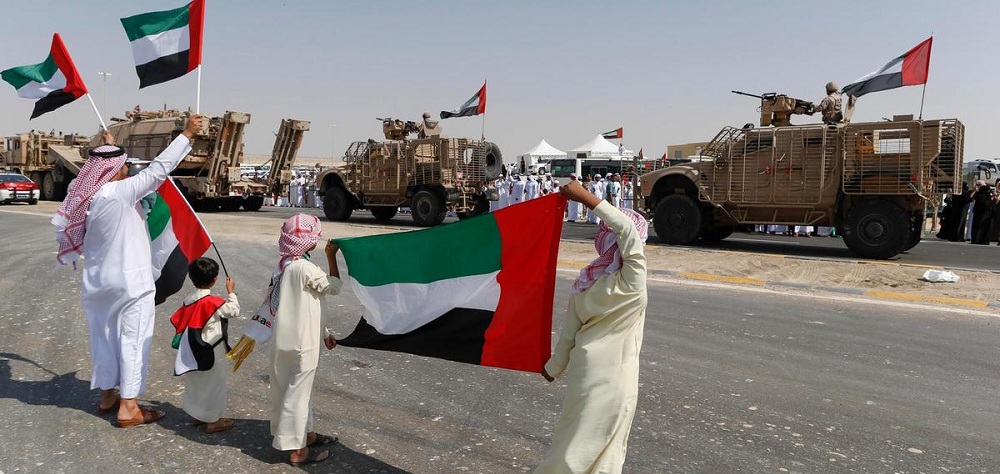Alwaght- Media reported about reduction of the UAE forces in the Yemen war over the past few weeks. On Monday, the UAE71.com news outlet, citing the spokesman for the resigned Yemeni government Wadah Dabish, reported that the Yemeni coastguards affiliated with the fugitive President Abd Rabbuh Mansour Hadi over the past few days have taken over control of the Zaghar Island of Yemen in the Red Sea from the Emirati forces.
Despite such moves, the majority of the media analyses and political circles do not think that the measures are signs that Abu Dhabi has an intention to end a fruitless war now in its fifth year. Rather, the Emiratis are seeking to continue by giving the military operations in the Arab country a new look. Nearly a month after the UAE said it plans to reduce its presence in Yemen, the evidence indicates that Abu Dhabi still holds the strategic places and position of Yemen it seized over the five years of war and does not seem it wants to move back from them.
According to Arabi24.com news website, the Southern Transitional Council, the forces under the command of Tareq Mohammed Abdullah Saleh, the nephew of the former Yemeni President Ali Abdullah Saleh, and other militias fighting as proxies for the UAE in Yemen are still fighting the revolutionary movement Ansarullah with about 90,000 well-trained fighters. Reports suggest that Abu Dhabi has recently united them all under the umbrella of a single command in an effort to, on the one hand, boost its control over them and, on the other hand, prevent frictions among them as in the past they several times clashed over territory and politics.
The news website added that the UAE-loyal forces, among them Saleh-led forces in Hudaydah city, Abu Al-Abbas Brigades in Taizz, and Hama Brigades in Socotra island— all trained in the UAE— are the militias active in the Yemeni home war under the support of the UAE.
The same report also noted that the UAE backs in Aden south of Yemen the Security Belt, a militia force whose formation has so far caused huge debate. Abu Dhabi also expanded its influence beyond Aden to cover neighboring cities like Lahij and Abyan. In the oil-rich city of Shabwa, in the southern end of the Arabian Peninsula, the Al-Shabwaniya militias loyal to the UAE have deployed their armored vehicles into the city without coordination with the security committee of the city. The forces have reportedly seized control of sensitive spots in the city as well as industrial parks and ports. These developments are taking place while the Emirati army in Yemen uses the site of Balhaf gas company as its main military base in the south of the country. The militant groups reportedly do not recognize the government of Mansour Hadi, which is recognized and backed by the UAE's ally in the conflict Saudi Arabia and directly take orders from the Belhaf-based Emirati command.
The UAE is believed to have announced the move to withdraw its forces in early July due to risks to its territory like the drone and missile strikes by Ansarullah that could have unpredictable consequences to its largely fragile economy and to ease the international pressures calling on the Saudi-Emirati military coalition to stop its atrocities against the Yemeni civilians who are suffering from an unprecedented humanitarian crisis. But can such an approach be of avail to Abu Dhabi’s pursuit of strategic interests in Yemen war?
UAE strategic objectives in Yemen
Abu Dhabi has entered the war on Yemen in March 2015 mainly driven by political and economic interests. The political interests in Yemen include a plan to split the country into two parts of south and north, prevent formation of a stable and strong government, and block power gain of the Yemen branch of the Muslim Brotherhood, an Islamist political movement with roots across the Arab and mainly at loggerheads with the ruling regimes which predominantly ban it as terrorist movement. The economic goal is domination over important ports to block Yemen’s economic growth that carries the potentials to transform the nation into a significant economic rival to the UAE as Yemen holds suitable geopolitical position to develop to such a status. The UAE struggles to bring under its control such important ports as Aden, Al Mukalla, and Mocha.
Just contrary to Saudi Arabia that now is the main loser of a costly war, the UAE has advanced to a major part of its goals and from now it abandons its previously-adopted combat policy and is expected to focus on saving what it has so far achieved in Yemen’s south. A southern separatist movement which holds an approach against the UAE earlier accused Abu Dhabi of pushing things to “explosion” in the southern cities via its proxy militias for the final goal of controlling oil and gas fields and also vital ports in the south.
The obstacles ahead of the new strategy
The new Emirati strategy to abandon a direct engagement in the war to relax the increasing international pressures and steer clear of provoking Ansarullah into retaliatory attacks on the UAE soil, which are now not an impossible job thanks to the advances in mass production of missiles and combat drones, can face a set of hurdles. The first one is the Ansarullah’s awareness of the main Emirati scheme to split Yemen. The resistant movement has honed its military skills during the war and promoted its military power and instruments to prevent the partition of the country after the end of the foreign aggression. It holds the pressure tools against Abu Dhabi as the main backer of the Saudi campaign against Yemen. Second, part of the southern movement and also the Yemeni public are opposed to the Emirati military presence and the colonial projects in their country. Several rounds of protests against the Saudi and Emirati military presence in the south over the past year are indications of the popular opposition to the foreign occupation.



























